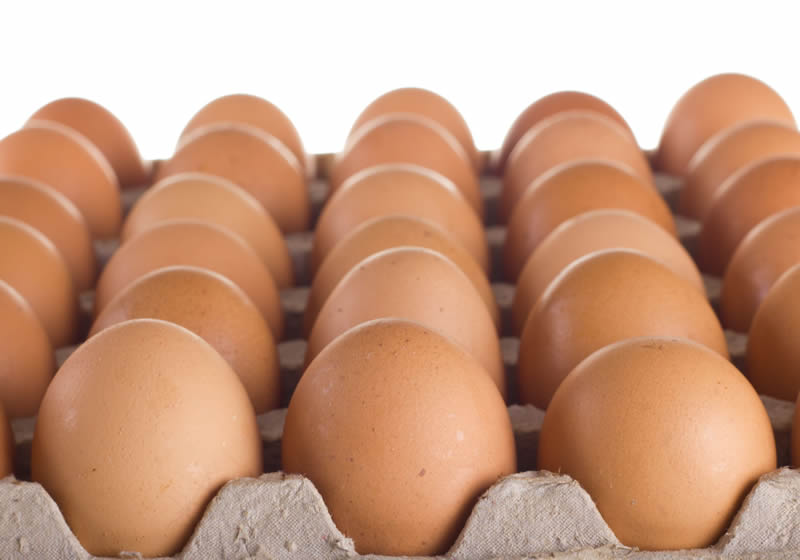
Investigators in the Netherlands have arrested two people and the EU has called an emergency meeting in response to the growing fipronil crisis.
In the United Kingdom, retailers are seeking written assurances that the banned pesticide has not been used by British egg producers, although the Food Standards Agency (FSA) says there is nothing to suggest it has been used on UK farms.
However, about 700,000 potentially contaminated eggs from Europe are thought to have been imported into the UK for use as egg product and four supermarkets have withdrawn some foods from their shelves as a precaution.
In the Netherlands, where fipronil seems to have been illegally used as a treatment against red mite, the Dutch food safety authority, NVWA, confirmed that two people had been arrested.
Those arrested are the two directors of the company that is believed to have applied the treatment on laying birds.
The Dutch authorities have been working with counterparts in Belgium, where the chemical is believed to have originated. Millions of eggs have been withdrawn from sale in the Netherlands, Belgium and Germany and more than 100 Dutch egg farms have been shut down.
The European Union Health Commissioner, Vytenis Andriukaitis, has called an emergency meeting in an attempt to stop the three countries trading accusations. "Blaming and shaming will bring us nowhere and I want to stop this,” he is reported to have said.
“But first things first. Our common job and our priority now are to manage the situation, gather information, focus on the analysis and lessons to be learned in view to improve our system and prevent criminal activity.”
Egg scandal
The United Kingdom has been drawn into the European contaminated egg scandal following confirmation by the FSA that eggs contaminated on European farms were imported into the UK.

Sainsbury's confirmed that all salads containing eggs were being removed from sale because there was a risk that eggs may contain small traces of fipronil.
Asda, Morrisons and Waitrose have also withdrawn some products from their shelves. Tesco said it was not affected.
Now, egg packers have apparently been asked by retailers to confirm in writing that no products containing fipronil have been used on their farms. Packers are, in turn, seeking the same assurance from the producers who supply them.
In the wake of the scandal, leading retailers have been criticised by British Lion Egg Processors for operating what it says are double standards - ensuring that shell eggs are British Lion whilst importing foreign egg for use in many other food products.
Ian Jones, chairman of British Lion Egg Processors, said: “This is just the latest of a number of food safety issues connected to eggs produced outside of the UK in recent years. Consumers clearly want retailers and food manufacturers to use good quality British ingredients that are produced to high standards of food safety, but in some prepared foods this is not the case.
“As we approach Brexit, shoppers are growing increasingly concerned about the ingredients used in manufactured food and now more than ever want and deserve transparency on food packaging. The egg industry believes that this is a great opportunity for retailers to listen to the concerns of their customers and reassure them by specifying the use of British eggs and using the ‘Made with British Lion eggs’ logo on packs.”
Production standards
British Free Range Egg Producers Association (BFREPA) Chief Executive Robert Gooch said: “British egg producers follow stringent production standards to ensure that what they produce is perfectly safe and nutritious for consumers to eat.
“Retailers have shown good commitment to British shell eggs but processed egg is often sourced from other countries.
“This incident should be a wake-up call for retailers. Consumers want safe, traceable food and we have a ready-made scheme which delivers that in the form of the British Lion Code.”
The FSA says there is nothing to suggest that the chemical has been used on UK farms. However, eggs contaminated in Europe have found their way onto the UK market.
The FSA originally thought that about 20,000 had been imported into the UK. The figure is now thought to be about 700,000.
An update issued by the FSA read: "We have now established that more eggs from affected farms than previously identified came to the UK. It is very unlikely that these eggs pose a risk to public health but, as fipronil is unauthorised for use in food-producing animals, we have acted with urgency to ensure that consumers are protected."
The FSA said that the products affected were processed foods in which egg was one ingredient among many others, mostly used in sandwich fillings or other chilled foods.
Eight locations
Investigators on the continent have searched a total of eight locations in the Netherlands.
Eurojust and Europol have been involved in co-ordinating cross border co-operation. The Dutch NVWA said that investigations were focusing on the Dutch company that allegedly applied the fipronil and the alleged Belgian supplier, as well as a company from the Netherlands that may have collaborated with the Belgian supplier.
It said the company and two drivers suspected of using the drug, the Dutch dealer, the Belgian supplier and its owner were suspected of threatening public health by the delivery or use of fipronil.
Investigators have searched the homes of the two people who were arrested and another house where one of the suspects stayed.
The home of a Belgian supplier has been searched, as well as that of a Dutch trader, a warehouse and two other unspecified locations. Officers have seized valuable goods such as cars, bank assets and property.
The FSA said the 700,000 contaminated eggs it believes to have been imported into the UK represented 0.007 per cent of the eggs consumed in this country every year. It said it was very unlikely that there was any risk to public health from consuming these foods.
"Some of the products made from these eggs will have had a short shelf life and will have already been consumed. However, we identified some that were still within the expiry date. These are now being withdrawn by the businesses involved."
'Acting quickly'
The FSA said the decision to withdraw products was not due to food safety concerns, but was based on the fact that fipronil was not authorised for use in food producing animals.
Heather Hancock, chairman of the Food Standards Agency, said: "I’m confident that acting quickly is the right thing to do. The number of eggs involved is small in proportion to the number of eggs we eat, and it is very unlikely that there is a risk to public health.
"Based on the available evidence, there is no need for people to change the way they consume or cook eggs. However, fipronil is not legally allowed for use near food-producing animals and it shouldn’t be there."
The FSA said it was reminding food businesses of their legal responsibilities to inform it and relevant local authorities immediately if they had any reason to believe that a food which they had imported, produced, processed or distributed did not comply with food safety requirements.
It said that 85 per cent of eggs consumed in the UK were laid in this country. There was no evidence that eggs laid in the UK were contaminated or that fipronil had been used inappropriately in the UK, it said.
Testing of eggs on farms was underway across the UK and results to date for England and Wales showed no exposure to fipronil.
The British Egg Industry Council (BEIC) has circulated guidance suggesting that egg producers seek advice from their vet if they have any concerns.
BEIC chief executive Mark Williams said in the circular: "As you may be aware, nearly 200 farms in the Netherlands have had restrictions imposed on them so they are not permitted to move eggs, manure and/or birds due to the use of DEGA-16. This is because fipronil has been mixed into the product."
"If producers do have any concerns, it is advised that they seek further advice from their vet," he said.
Warning system
Eggs have been withdrawn from sale in both Germany and Belgium after the Dutch authorities raised the alarm.
"We work in a warning system with Brussels," said a spokeswoman for the NVWA. "If we find something then we can use this to let other countries know."
The NVWA has made a list of egg codes that may have been affected by contamination. These have been circulated to other countries to prevent them being sold to the public.
The NVWA spokeswoman said that restrictions remained in place on 138 farms producing eggs in the Netherlands.
"This means that they cannot sell the eggs or bring them to market. They will have to be destroyed." She said that eggs were not allowed to be destroyed by producers, themselves; the work had to be carried out officially.
She said it was unknown how long the restrictions would remain in place because the authorities were still trying to analyse results and understand how long the effect of the treatment would continue to contaminate eggs.
She said that all the farms investigated for contamination had used the same company to treat their birds. "We know that from receipts at the farms."
Anger
The Dutch egg industry organisation, Ovoned, has expressed anger at the contamination crisis. The organisation issued a statement saying that egg producers were innocent victims of something that should not have happened.
It said farmers had contracted a company to treat their birds against red mite, expecting that the treatment used would be effective and safe.
Ben Dellaert, director of Ovoned, as well as chairman of the International Egg Commission, told FarmingUK: "It turns out that several farms in the Netherlands, Germany and Belgium (and maybe other countries) have used a company for a treatment against red mite.
"Now it turns out that the substance used contains fipronil, which is normally used against fleas on cats and dogs. Legislation forbids the use of fipronil on poultry."
Mr Dellaert said that restrictions had been imposed on farms, meaning that eggs, birds and manure had to stay on the farm. He said restrictions could be lifted if the level of fipronil in eggs fell below a certain level.
He said the egg sector, itself, had already blocked the affected farms, starting on July 22. This meant that packing stations would not collect eggs from these farms.
NVWA told FarmingUK that treatment with the suspect chemical had been carried out on chickens over a period from January to July.
